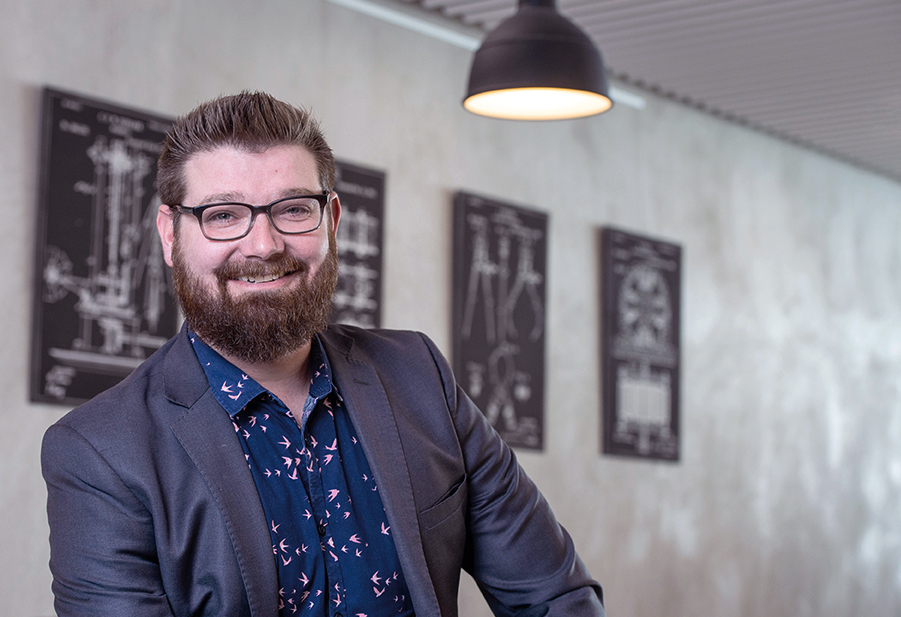
Associate Professor Justin Chalker is planning to minimise the damage oil spills are having on our oceans through the use of a newly created, rubber-like material.
Ocean oil spills are an inherent risk in extracting oil from the sea floor and transporting it around the world, yet ocean oil mining occurs every day. If there is a spill, clearing the oil from the water is no easy task. While the clean-up takes place – usually over weeks, months or sometimes not at all – the oil has time to cause decades of irreversible damage to the ocean and marine life, and to the health of local communities.
And so, when a synthetic chemist stands up and suggests pouring more oil, intentionally, into the ocean to remedy the initial spill, it is understandably met with questions.
Luckily, Associate Professor Justin Chalker likes questions: ‘Questions set you on a hunt for answers.’
A synthetic chemist and researcher, Associate Professor Chalker completed his PhD in Organic Chemistry at the University of Oxford in the UK. He is a Research Leader for the Flinders University Institute for Nanoscale Science and Technology, and runs the Chalker Research Lab from Flinders.
Associate Professor Chalker believes chemists are in a unique position to solve many of the biggest problems facing the environment. And it is exactly these problems his team of researchers are focused on. Their work is to create new molecules and materials, and to bring new matter into existence and then put it to use. In the truest sense, they are looking for answers in the unknown.
What sets this work apart is their focus on using waste products to create new materials.
‘The polymer we’ve invented is a material made from sulphur, a by-product of the petroleum industry, and canola oil. It’s a renewable resource,’ he says. ‘By simply reacting these two materials together, it thickens and turns into a brown rubber and we get an entirely new substance – one that we found can be used to clean up oil spills.’
The new polymer acts like a sponge that floats and quickly absorbs unwanted oil. Importantly, it returns clean water to the sea and leaves only the crude oil on the polymer. The oil can later be drained from the polymer and safely disposed of, and the polymer can be used again.
Creating affordable and accessible solutions is an important consideration for Associate Professor Chalker – a significant benefit of waste material is that it’s cheap and readily available.
Areas like the Amazon Basin in Ecuador and Niger Delta in Nigeria are economically dependent on the oil industry but are operating without the same access to adequate oil spill solutions. As a result, the environmental impacts on these oil-bearing areas is disproportionate to wealthier oil drilling areas. In Nigeria, the UN has estimated that it will take more than 30 years to reverse the environmental impacts from their oil spills.
‘My broadest and most ambitious goal is to use synthetic chemistry to improve the lives of those who don’t have the same access to resources to have a fair go in tackling environmental disasters,’ says Associate Professor Chalker.
‘By focusing on inexpensive materials to capture pollution, we can ensure clean air, water and food for everyone in the world – not just those in wealthy nations.’
In February 2020, a formal agreement between the Chalker Research Lab and Clean Earth Technologies assigned a suite of patents to the Singapore-based company to commercialise the new polysulfide material for global markets. The first manufacturing facility is set to be established in South Australia.
Professor Robert Saint, Deputy Vice-Chancellor (Research) at Flinders, says, ‘I can think of no better example than the work of the Chalker laboratory in turning outstanding research into new resources that can be used to deliver a cleaner world.’
Associate Professor Chalker has also discovered that the same sulphur-canola oil polymer can extract mercury from polluted soil, water and air. Mercury poisoning occurs primarily in artisan and small-scale gold mining in some of the world’s poorest countries and affects more than 15 million people.
Other threats to clean air and water, such as PFAS pollution (residue from fire-fighting foam) and the mounting impacts of plastic pollution, are also being investigated. With 91% of plastic not being recycled, most will end up in landfill or the ocean.
Plastic was masterminded by chemistry so Associate Professor Chalker thinks chemists should be at the forefront of efforts to make amends.
‘The chemistry that was used to make plastic is almost too good, because it’s so stable it doesn’t break down and now plastic is wreaking havoc on the environment.’
His team is now working towards creating new materials that are biodegradable – or more able to be recycled – made from waste or sustainable resources, of course.
‘We’re always at the cusp of a new discovery or technology that can change the way we think and live, and that’s something that we want to be at the forefront of. We want to be involved in these changes.’

